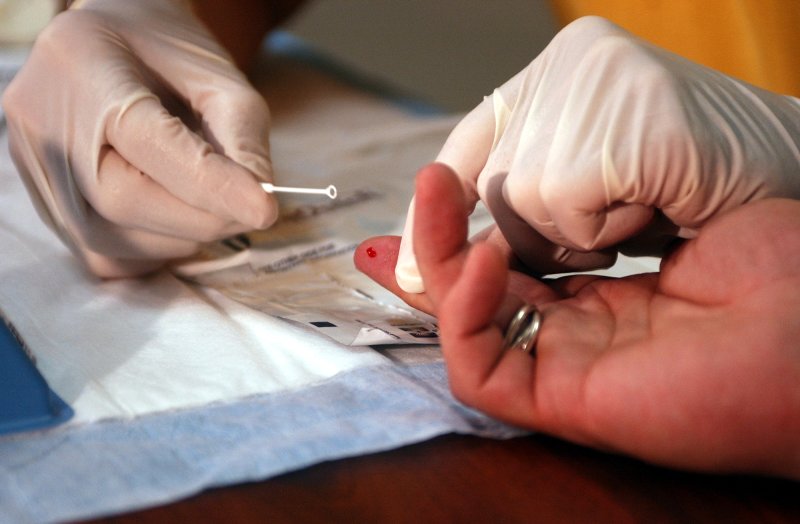A patient named Michael, who does not wish to have his last name revealed, gets tested for HIV at the Whitman-Walker clinic in Washington, on June 26, 2003. Researchers are currently testing a new vaginal ring which could be used as both protection against HIV and as a contraceptive. File Photo by Michael Kleinfeld/UPI |
License Photo
May 3 (UPI) -- Researchers are testing a new vaginal ring that women could use to protect against HIV infection and also serves as a contraceptive.
A vaginal ring with the antiretroviral drug dapivirine and a hormonal contraceptive is being tested in a Phase I clinical trial by the National Institutes of Health and funded by Microbicide Trials Network, or MTN.
A vaginal ring containing dapivirine alone was shown to be safe and effective at protecting against HIV in two prior large clinical trials called ASPIRE and The Ring Study.
In the trials, a monthly 25 milligram dapivirine vaginal ring were shown to effectively deliver antiretroviral to prevent HIV infection, with final analysis showing a 30 percent reduction in overall risk of HIV infection and it was most effective in women who used it regularly.
"Many of the women who have participated in our studies have told us that they want a single product that can provide both contraception and HIV prevention," Sharon Hillier, principal investigator at MTN, said in a press release. "We are excited about the next-generation microbicide products that we hope will address that unmet need."
The study will be conducted at Magee-Women's Hospital of UPMC in Pittsburgh and the University of Alabama at Birmingham, enrolling 24 women in the study, known as MTN-030/IPM 041. The women will wear the vaginal ring for 14 days in the Phase I trial.
Investigators will monitor the safety and measure how the dapivirine and levonorgestrel are absorbed by the body.
"What we learn from this small but very important study will set the course for the future of the dual-purpose dapivirine vaginal ring," said Dr. Sharon L. Achilles, lead investigator in the trial. "If all goes well, we would then proceed to studies involving more women who would use the ring longer, for up to three months, as it was intended. This study is a critical first step on a pathway that we hope will ultimately enable use to provide women with an easy-to-use product that can provide safe and effective, long-acting protection against both HIV and unintended pregnancy."
A second Phase I study will evaluate the safety of a 100 milligram dapivirine ring and a 200 milligram ring when used for 90 days compared to monthly use of the 25 milligram ring.















